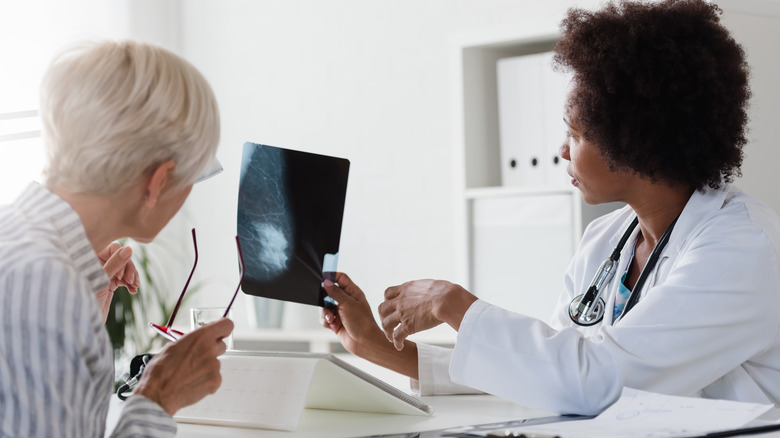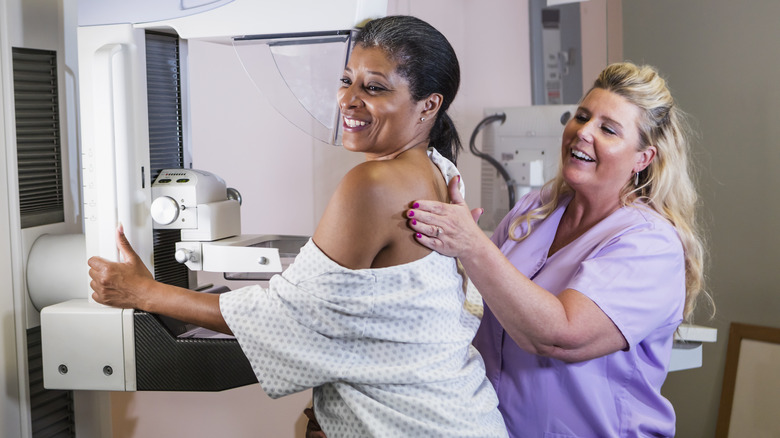Do You Still Need Mammograms And Pap Smears After Menopause? A Gynecologist Weighs In
A person enters menopause when one year has passed since their last menstrual period, according to the Cleveland Clinic. In an exclusive interview, we spoke with Dr. Suzanne Weber, a board-certified gynecologist and menopause specialist, who shared whether routine exams such as mammograms and pap smears are still recommended after menopause.
Dr. Weber starts off by explaining the purpose and importance of each exam. "A screening mammogram is the best available test for detecting breast cancer," she states. "It can be less sensitive in a woman with dense breast tissue, but it remains our first-line screening test. An abnormal mammogram will usually be followed by a more in-depth mammogram and possibly a breast ultrasound."
"A pap smear is a test to detect cervical cancer," she goes on to explain. "It is collected in the doctor's office with a pelvic exam during which a vaginal speculum is used to visualize the cervix." Dr. Weber states that a pap smear test is able to detect HPV in patients. "HPV (Human Papillomavirus) can be detected from the collection of cervical cells too. HPV causes more than 90% of cervical cancers," she says.
Dr. Weber emphasizes that there's no question when it comes to getting mammograms and pap smears as one ages. "A woman absolutely still needs paps and mammograms after menopause," she states.
How menopause can impact test results
Dr. Weber says that menopause can potentially influence the results of mammogram and pap smear tests. However, physicians have measures in place to address these concerns. "After menopause, a woman's breast density may decrease if she doesn't use systemic hormones," Dr. Weber explains. "[B]ut many women continue to have dense breast tissue on their mammogram, which can make the mammogram more likely to miss breast cancer."
In the case of pap smears, Dr. Weber states, "If a woman has vaginal atrophy or thinning, she may be more likely to have an insufficient Pap where not enough cells are collected to give a result. She would simply need to repeat her exam for another collection of cells." Additionally, Dr. Weber points out that menopause can sometimes increase the chances for incorrect test results. "Due to lack of estrogen, which causes thinning of vaginal and cervical tissues and sometimes inflammation, the cervical cells may be more likely to appear abnormal on a pap smear," she explains. "An HPV test can be used to determine if it is a worrisome abnormality."
Screening frequency recommendations
Dr. Weber goes on to tell us exclusively, "The average age of menopause is 51-52 years (typical range in age is 45-55 years). The median age of cervical cancer diagnosis is 50, so half of all cervical cancers occur over the age of 50." Similarly, older adults are also at an increased risk of breast cancer, she explains. "The risk of breast cancer as well as other cancers increases as we age, and the average age at breast cancer diagnosis is around 63."
Dr. Weber states that how frequently a person may need to undergo screenings can vary. "Depending on age and risk factors, a woman should be screened with a pap every 3 years minimum from ages 21-29," she says. However, this can change as one gets older. "Between the ages of 30-65, there are several options: Pap every 3 years, Pap and HPV test every 5 years, or HPV test every 5 years," Dr. Weber explains. "Over 65 years, a woman may choose to stop paps if she has been well-screened without any previous abnormalities; however, I prefer to continue to screen women over 65 since 20% of cervical cancers are diagnosed in women over 65."
In regards to mammograms, Dr. Weber states, "The American College of Obstetricians and Gynecologists (ACOG) recommends mammograms yearly starting at 40." Yet again, this too can vary. "The decision when to start mammograms should consider a woman's preferences, personal medical history, and family history as well."



